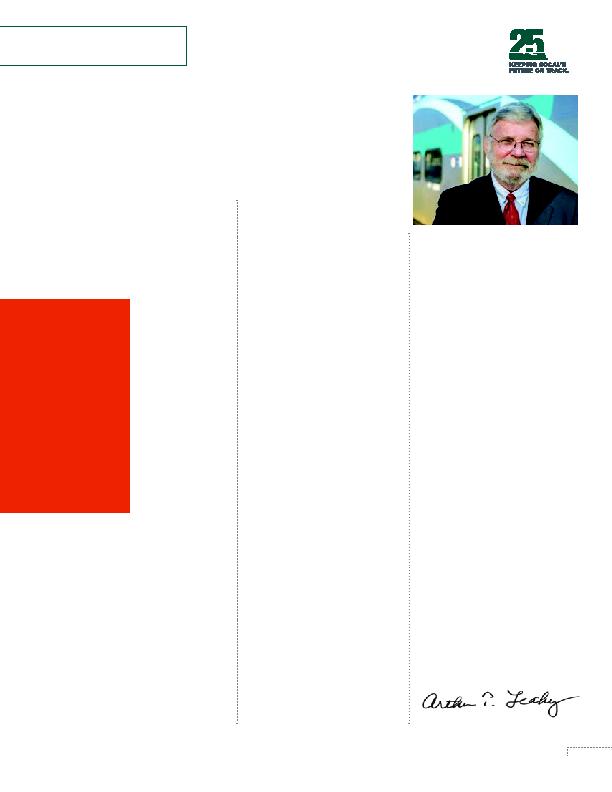
MUST PUT OUR
CUSTOMERS FIRST.
FOR SIPHONING
MORE CARS OFF
OUR FREEWAYS
AND KEEPING OUR
REGION ON THE
MOVE.
that and give relief to our congested freeways. That
held true 25 years ago. It holds true today.
Fewer cars means people can get
where they need to go faster and
without stress. And as we look ahead,
Metrolink is uniquely poised to do
even more to ease traffic in a region
worst congestion in
the nation.
statement, but the
reality is that 82
percent of our riders
could drive to work,
and most commute
long distances across
county lines. So,
for just about every
Metrolink train rider,
one car or truck is
parked somewhere,
so many in fact that
Metrolink eases traffic
lanes of freeway traffic during rush
hours.
ending, even if billions of tax dollars
were readily available. But we can
add more trains to help handle not
only today's demand for service but
future demand in Southern California
as our population grows by 4 million
residents by 2035 to about 23 million
people. Half that growth will take
place in the Inland Empire.
in San Bernardino and Orange
Counties in cities like Irvine but
also in Riverside, Santa Clarita and
northern Los Angeles County and
other areas. Downtown Los Angeles
will remain the vital center of the
region and its transportation system.
Metrolink will knit these disparate
communities together, providing
access to jobs, schools, hospitals,
shopping, sports, cultural and
entertainment venues. Our regional
service complements local transit
operators as well as Amtrak.
secure adequate funding to,
most importantly, ensure that our
equipment, track, bridges, signals
and maintenance facilities are kept
in a state of good repair and bolster
safety as well as expand service.
prudent staff and an enterprising
governing board that has always
found creative ways to succeed. In an
era when major transit agencies are
losing riders, Metrolink is still showing
gains. On-time performance and
service reliability keep improving.
Metrolink should consider drawing
new riders by offering such
passenger amenities as a beverage
Barbara or San Luis Obispo. Perhaps
we should explore truncating some
Oceanside service at Irvine to add
trains on the Inland Empire-Orange
County line to meet pent-up demand.
entire Metrolink system and add
more signals to bolster speed and
reliability. Run-through tracks at Union
Station could save travel time. Diesel
multiple units and rail cars smaller
trains powered by on-board diesel
engines instead of locomotives
might be an option in the not so
distant future to run more midday
and evening trains.
ride-hailing companies Uber and Lyft
to help shuttle riders to and from our
stations. And we must figure out how
to reduce fares while still recovering
44 percent of our trip costs from
riders and other sources, the highest
among public transit operators in
Southern California.
first. That's the ticket for siphoning
more cars off our freeways and
keeping our region on the move.